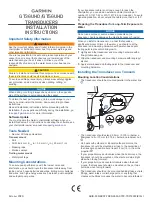
- 12 -
OUTPUTS AND INPUTS CONFIGURATION
OUTPUTS
The outputs are set by default as follows:
/
/
/
/
.
Possible operation modes:
-
(normally open)
: the relay is de-energised and the contact is open when the weight is
lower than the programmed setpoint value; it closes when the weight is higher than or equal to
the programmed setpoint value.
-
(normally closed)
: the relay is energised and the contact is closed when the weight is
lower than the programmed setpoint value; it opens when the weight is higher than or equal to
the programmed setpoint value.
-
: the contact will switch on the basis of weight, according to setpoint (see section
SETPOINT
PROGRAMMING
).
-
: the contact will not switch on the basis of weight, but is controlled by remote protocol
commands.
-
: relay switching occurs when the weight is stable.
-
: relay switching occurs when one of the following alarms is triggered:
,
,
,
,
,
,
; the operation mode is forced to
(normally
closed).
If the operation mode
is selected, the following options are also active:
-
: the contact will switch on the basis of gross weight.
-
: the contact will switch on the basis of net weight (If the net function is not active, the
contact will switch on the basis of gross weight).
-
: relay switching occurs for both positive and negative weight values.
-
: relay switching occurs for positive weight values only.
-
: relay switching occurs for negative weight values only.
By confirming with ENTER the setpoint operation can be set to the value 0:
-
: relay switching will not occur if the setpoint value is 0.
-
:
-
setpoint = 0 and switching =
: relay switching occurs when the weight is 0; the
relay will switch again when the weight is different from zero, taking hysteresis into
account (both for positive and for negative weights).
-
setpoint = 0 and switching =
: relay switching occurs for a weight higher than or equal
to 0, the relay will switch again for values below 0, taking hysteresis into account.
-
setpoint = 0 and switching =
: relay switching occurs for a weight lower than or equal
to 0, the relay will switch again for values above 0, taking hysteresis into account.
+
…
…
















































